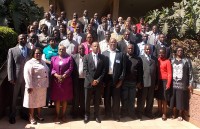A report from a regional capacity building workshop for senior law enforcement officers has identified police concerns about the impact of HIV on individual officers and their organisations. The workshop focused on HIV, human rights and the law. Participants in the workshop were drawn from five countries in Eastern and Southern Africa Region where UNDP is currently supporting work focusing on HIV and the law, including Kenya, Lesotho, Zambia, Malawi, Tanzania and Swaziland.
Excerpt from the report:
With strong evidence showing the vital role of the law in HIV prevention and access to treatment, law enforcement officers cannot be left behind in efforts to eliminate HIV. As custodians of the law, they influence the legal environment within which response to the HIV pandemic is undertaken. Their enforcement of HIV-sensitive laws increases resilience to HIV whereas their enforcement of negating laws increases vulnerability to HIV.
Despite this, there has been limited opportunity for law enforcement officers in Kenya and in Africa to take stock of epidemiological developments, as well as the evolving roles of the law and law enforcement authorities in the response to HIV. The few law enforcement officers who have contributed to creating enabling legal environments for effective HIV and TB responses have had even fewer platforms to share their lessons with colleagues.
UNDP and KELIN have therefore established a partnership to implement recommendations of the Global Commission on HIV and the Law, aimed at engaging law enforcement officers on effective HIV intervention measures. One of the activities undertaken under this partnership was a three-day Regional Workshop for Senior Law Enforcement Officers on HIV, Human Rights and the Law. The workshop was convened with objectives to:
a) Provide a critical opportunity for discussion and experience-sharing between law enforcement officers from Kenya and other African countries on the complex legal and human rights issues posed by the HIV and TB epidemics.
b) Provide a platform for open dialogue and building partnerships between networks of vulnerable communities, police officers, prison wardens and other partners for strengthened HIV and TB responses.
c) Gain a common understanding on HIV workplace programs for law enforcement officers and to identify barriers and opportunities to accelerate such programs at the country level.
d) Foster regional and intra‐country sharing of experiences, lessons learned and other resources on HIV interventions for law enforcement officers in line with the findings of the Global Commission on Law and HIV.
————————
The workshop also gave police officers an opportunity to reflect on the ways that HIV affects police organisations and individual officers. As seen below, their responses demonstrate a deep concern about structural issues which shape vulnerability to HIV for law enforcement officers in the region.
The following concerns were highlighted by participants with respect to the impact of HIV on the police organisation:
• Absenteeism
• Funeral expenses
• Making arrangements for reasonable accommodation
• Transfers – some PLHIV want to be transferred to workstations closer to their native homes
• Reduced workforce/ performance
Officers also considered factors which stop police from fully participating in HIV prevention and treatment programmes:
• Fear of knowing my status
• Stigma • People shunning any form of help
• Such programmes when carried out target prisoners and not law enforcement officers
• Inadequate budget for such programmes
Police identified how the composition of the workforce and the nature of their work might make them more vulnerable to HIV infection:
• Frequent travel away from family
• Police ‘gunpower’ makes them sexually attractive
• Criteria for police selection – fine looking men who are then sent off to far areas
• Intensive training of young policemen/women with no break to interact
• Gender power dynamics – top leadership is mostly occupied by men
• Officers exposed to TB when interacting with prisoners



